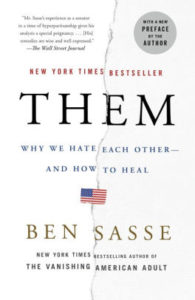William B. Eerdmans Publishing Company has been a family-owned and operated business for over a hundred years, reflecting the unique visions of its two long-time leaders–William B. Eerdmans Sr. and Jr.
Continue reading “Life at a Hundred”
Month: February 2019
In the Habit of Waiting
In the last few years I’ve started a habit. A simple habit. And I have been a bit surprised how helpful it has been. This is the habit.
Continue reading “In the Habit of Waiting”
Why Do We Hate Each Other?
Why are Americans so at odds with each other? Why have so many people entrenched themselves in opposing camps, viciously vilifying each other? What has turned us into a nation of Us vs. Them?
Is cable news responsible? Did the Russians do it? Does it go back to Newt Gingrich or the Robert Bork confirmation?
 In his book, Them, Senator Ben Sasse has a very unpolitical answer. It’s because, he says, we are lonely. We have fewer friends. We are more disconnected from our communities. So we grasp for a group to feel part of, to identify with. More and more that manifests itself in our political and social identities.
In his book, Them, Senator Ben Sasse has a very unpolitical answer. It’s because, he says, we are lonely. We have fewer friends. We are more disconnected from our communities. So we grasp for a group to feel part of, to identify with. More and more that manifests itself in our political and social identities.
Since World War II single-person households have tripled to 26 percent. Technology has also pushed us into self-reinforcing corners where we just don’t encounter people as people who might have differing views. Other significant factors are at work as well.
Yes, cable news and radio talk showmen and show women have taken advantage of our situation. And yes, the Russians have fanned the flames too with more than 50,000 Russian-linked Twitter accounts fueling outrage by sending automated messages on both sides of issues. But these only feed on a pre-existing condition.
What’s the cure for our illness? The last half of the book offers several worthwhile remedies, from setting tech limits in our personal lives to building into a neighborhood or community to re-educating ourselves on how democracy works and what it stands for.
Sasse regularly says the book is not political in the sense of party politics or hot-button issues. He is right. The book is social and personal. When he does touch on political examples, he is to be commended for being very evenhanded–criticizing and praising as appropriate both right and left, both politicians and journalists, both Republicans and Democrats. Sasse models how we can treat each other as human beings, as fellow Americans who deserve our listening ear and our respect.
The Importance of Being Factual
The world is better than you think. Really? Really. Consider these–all based on UN statistics:
- Life expectancy has risen worldwide from 31 years in 1800 to 72 years in 2017.
- No country in the world has an average life expectancy of less than 50 years today.
- The percentage of undernourished people has dropped from 28% in 1970 to 11% in 2015.
